
|
A Little Known History of a Baha'i Youth in the 1950s:
I was a Baha'i Youth--circa 1953--registered as such in Washington, D.C. I was converted to the Faith then. Later, in 1957 I became, I'm afraid, an apostate, though I've always remained grateful to the Faith for its principles such as planetary and racial unity and the equality of the sexes. It was this last principle that I came to embody most, at least in my own mind. My major work, published in 1975 by Penguin Books, is called Men's Liberation: A New Definition of Masculinity. The following two coincidences had nothing to do with my becoming a Baha'i youth, but (1) My mother, now 87, was born and brought up in Wilmette (where the first American Baha'i temple was built on Lake Michigan). (2) My own childhood home was in Chevy Chase, Maryland, where, from my kitchen window (throughout the years) I was able to see the Baha'i author, Stanwood Cobb, on his lengthy front porch on the next street, Grafton Street, doing his breathing exercises 3 times daily. Later, after I'd become a Youth in 1955, I worked at Mast Cove Camp in Eliot, Maine as a summer camp counselor for Dr. Cobb, located next door to (the Baha'i summer school) Greenacre.
He had a Muslim niece, Touran Araghi, who loved him mightily and cared for him (he was nearly 75) and the two of them befriended me because of my intense interest in Iran. Khan also gave Sunday evening talks at his Persian art shop about Omar's Rubaiyat, which he interpreted spiritually. Shortly thereafter, I returned to Washington as did Khan and his niece where our friendship continued to evolve --I began helping him on a daily basis--he had a kind of arthritic condition in his hands--and so I helped type his memoirs and so forth. I was fifteen. The Iranian diplomats were very shocked that I'd become a Baha'i and my association with them went on the wane. But for the period between 1953-1956, I was, truly, a young Baha'i scholar. But, I was also discovering that I was capable of same-sex love and affection. I talked to a number of Baha'is in that benighted era, hoping that my inclinations could somehow be adjudged healthy. There seemed very little information available on same-sex love in the Writings of that time. Several people told me I could not be a Baha'i and gay.
At nearly the same time, however, I began reading in the very few books then available about homosexuality. The rest is history. Today, I'm called one of the Founding Fathers of the gay and lesbian civil rights movement. My life has been extraordinarily satisfying. A few of the histories in which I'm mentioned tell of my teen-aged Baha'i contacts. The latest and one of the most important (it just was published last week) and is called Before Stonewall:Activists for Gay and Lesbian Rights in Historical Context Here's a link to it: http://www.haworthpressinc.com/ store/product.asp?sku=4646&AuthType Therein I'm quoted telling of my early Baha'i background. The same may be said of two other histories listed on my resume linked below: Lonely Hunters (by Dr. James T . Sears) and The Other Side of Silence by John Loughery. My bio/resume, I suppose, tells the rest of the story which, by making this story available to you may help to encourage a better reception for people who are inclined to same-sex love than I was to receive in the mid-1950s. http://www.gaytoday.com/garchive/jackbio.asp I founded the East Coast's first Council on Religion and the Homosexual in 1963-64 through the Mattachine Society of Washington (which I also co-founded) but I didn't invite Baha'i representatives to our ecumenical dialogues at American University because I feared they'd be uniformly hostile to the ideas expressed. I do hope that today you wouldn't side with Jerry Falwell and Pat Robertson. As I've often told others, I've always very much appreciated the benign influence that the Faith had on me as a teen. Warmest regards, From the Office of External Affairs of the National Spiritual Assembly of the Baha'is of the United States December 4, 2002 Mr. Jack Nichols Dear Mr. Nichols,
In your letter, you express your hope that the sharing of your story might help the Bahá'í community to be less hostile to people inclined to same-sex love. While, as you are aware, the Bahá'í Writings do not condone sexual relations between two people of the same sex, your friendship with Ali-Kuli Khan served to demonstrate the distinction between acceptance of this belief and hostility towards or discrimination against individuals experiencing same-sex attraction. Although the Bahá'í community does not claim that all Bahá'í individuals are free of the prejudices that plague society, the position of the Bahá'í Faith on homosexuality should not be identified with the disparaging and confrontational views espoused by some groups. Again, we sincerely thank you for sharing your story with us, and wish you the best in your future work. Please do not hesitate to contact our office directly, if we may be of assistance to you.
Sincerely, What do the Baha'i Writings say about Same-Sex Love?
Baha'i Scriptural References to Same-Sex Love January 9, 2003 Dear Mr. Nichols,
"It is forbidden you to wed your fathers' wives. We shrink, for very shame, from treating of the subject of boys. Fear ye the Merciful, O peoples of the world! Commit not that which is forbidden you in Our Holy Tablet, and be not of those who rove distractedly in the wilderness of their desires." From the Notes: "134. the subject of boys 107 "The word translated here as 'boys' has, in this context, in the Arabic original, the implication of pederasty. Shoghi Effendi has interpreted this reference as a prohibition on all homosexual relations. "The Bahá'í teachings on sexual morality center on marriage and the family as the bedrock of the whole structure of human society and are designed to protect and strengthen that divine institution. Bahá'í law thus restricts permissible sexual intercourse to that between a man and the woman to whom he is married. "In a letter written on behalf of Shoghi Effendi it is stated: 'No matter how devoted and fine the love may be between people of the same sex, to let it find expression in sexual acts is wrong. To say that it is ideal is no excuse. Immorality of every sort is really forbidden by Bahá'u'lláh, and homosexual relationships He looks upon as such, besides being against nature. To be afflicted this way is a great burden to a conscientious soul. But through the advice and help of doctors, through a strong and determined effort, and through prayer, a soul can overcome this handicap.' " The authority of the Guardian to make such an interpretation is conferred by 'Abdu'l-Bahá in His Will and Testament: "The sacred and youthful branch, the guardian of the Cause of God as well as the Universal House of Justice, to be universally elected and established, are both under the care and protection of the Abhá Beauty, under the shelter and unerring guidance of His Holiness, the Exalted One (may my life be offered up before them both). Whatsoever they decide is of God. Whoso obeyeth him not, neither obeyeth them, hath not obeyed God."
We hope that this information is helpful to you, and thank you again for contacting our office. Please feel free to write again, should you have further questions.
Sincerely, |
|
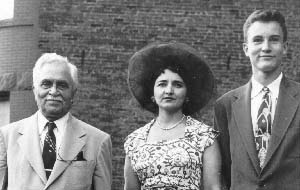 Ali Kuli Khan, his niece, Touran Araghi
and Jack Nichols in Washington, D.C., 1953
Ali Kuli Khan, his niece, Touran Araghi
and Jack Nichols in Washington, D.C., 1953 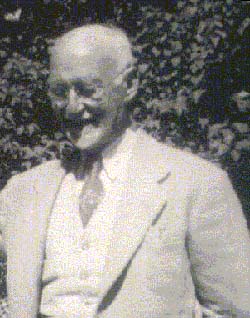 Stanwood Cobb, the Baha'i educator and
author, was Valedictorian at
Dartmouth, 1905
Stanwood Cobb, the Baha'i educator and
author, was Valedictorian at
Dartmouth, 1905 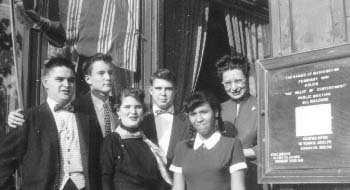 Jack Nichols (second from left) with a
group of Baha'i youths in front of the
Baha'i Center in Washington, D.C. 1954
Jack Nichols (second from left) with a
group of Baha'i youths in front of the
Baha'i Center in Washington, D.C. 1954 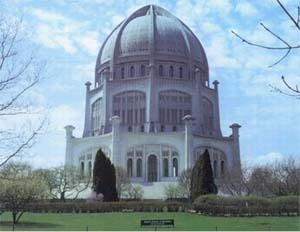 A Baha'i temple in Wilmette, Illinois
A Baha'i temple in Wilmette, Illinois 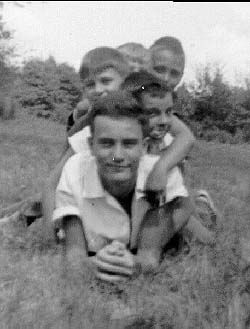 Jack Nichols (1955) was a
counselor at a summer camp
in Eliot, Maine owned by Stanwood Cobb, a
well-known Baha'i author
Jack Nichols (1955) was a
counselor at a summer camp
in Eliot, Maine owned by Stanwood Cobb, a
well-known Baha'i author 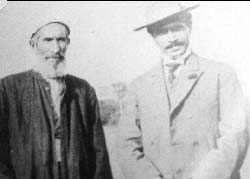 Ali Kuli Khan (right) with Mirza Abu'l Fazl,
one of the foremost disciples of the founder of the
Baha'i World Faith. 1900
Ali Kuli Khan (right) with Mirza Abu'l Fazl,
one of the foremost disciples of the founder of the
Baha'i World Faith. 1900 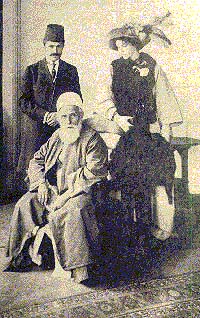 Ali Kuli Khan and his American wife, Florence
(1912) with one of the three major fountainheads of
the Baha'i religion, Abdul Baha
Ali Kuli Khan and his American wife, Florence
(1912) with one of the three major fountainheads of
the Baha'i religion, Abdul Baha